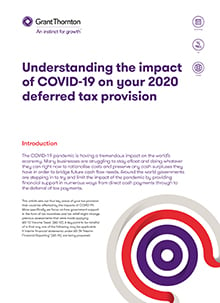The COVID-19 pandemic is having a tremendous impact on the world’s economy. Many businesses are struggling to stay afloat and doing whatever they can right now to rationalise costs and preserve any cash surpluses they have in order to bridge future cash flow needs. Around the world, governments are stepping in to try and limit the impact of the pandemic by providing financial support in numerous ways from direct cash payments through to the deferral of tax payments.
This article sets out four key areas of your tax provision that could be affected by the impacts of COVID-19. More specifically we focus on how government support in the form of tax incentives and tax relief might change previous assessments that were made applying IAS 12 ‘Income Taxes’ (IAS 12). A key point to be mindful of is that any one of the following may be applicable if interim financial statements under IAS 34 ‘Interim Financial Reporting’ (IAS 34) are being prepared.
Four key tax provision areas that could be affected by COVID-19:
Recognition of deferred tax assets
For an established business with a long history of profitability, deferred tax assets are often recognised without debate for deductible temporary differences that exist at each reporting date. For many entities, deferred tax assets can be recognised for non-capital losses, but only when supported by convincing evidence that future taxable profit exists. This requirement is set out more fully in IAS 12.35-36. Under this standard, when it is no longer probable that future taxable profit will be available, any previously recognised deferred tax assets recognised on that basis may need to be reversed.
Entities that have been considerably impacted by COVID-19 should reassess any deferred tax assets previously recognised. No matter whether it is interim or annual financial statements being prepared, one of the greatest challenges for reporting entities will be providing compelling evidence to support the profitability assumptions that have been made into the future. A key point to note is that while entities can carry net operating losses forward for long periods (depending on the jurisdiction), financial statement preparers may be challenged by regulators, auditors and others when developing projections of future profitability that exceed five years.
In July 2019, the European Securities and Markets Authority (ESMA) clarified that DTAs should be recognised to the extent that it is ‘more likely than not’ that they will be realised, ie a greater than 50% probability of utilisation exists for those DTAs recognised – and provided specific guidance on what this means in practice. ESMA also clarified its definition of ‘convincing other evidence’ to support the expectation of future taxable profits. While ESMA is a European authority, the guidance issued may be helpful to users of IFRS in other jurisdictions.
Deferred tax liabilities associated with investment in subsidiaries
For many entities with foreign subsidiaries, accumulated foreign profit is usually re-invested in overseas operations or used to finance further global expansion. As a result of COVID-19, many entities are assessing whether these earnings should now be repatriated to the parent entity’s jurisdiction through dividends. Dividends received by the taxpayer may have to have a full dividend deduction attached to them provided they are paid out of active business earnings of the foreign subsidiary.
There are other instances when these dividends are subject to corporate level tax. IAS 12.39 does not require the recognition of deferred tax liabilities associated with these, ‘outside basis differences’, so long as management has control over the disbursement of funds, and it is probable that these funds will not be repaid within the foreseeable future. With the COVID-19 pandemic, preparers of financial statements should be modelling possible contingency plans that include needing to fund future deficits associated with any resulting economic downturn the entity might encounter.
Any company that has plans to incorporate cash repatriation to the entity’s jurisdiction might discover that a tax liability needs to be recognised. Management should, therefore, assess carefully whether or not a deferred tax liability associated with these, ‘outside basis differences’, has to be recognised in the entity’s financial statements if the cumulative conditions of IAS 12.39 are no longer expected to be met.

